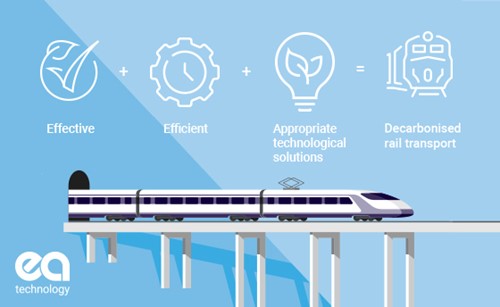Impact of Rail Network Decarbonisation
-
17 June 2022
-
David Mills

Client need
Northern Gas Networks (NGN), owner and operator of the distribution gas network across the North of England, were successful in securing £113,594 from the Ofgem Strategic Innovation Fund (SIF) Discovery phase, 2021-22.
The two-month Discovery project focused on the decarbonisation activities for the rail industry and how they interact with the electricity and gas networks (hydrogen). This project was funded by energy network users and consumers through the Strategic Innovation Fund, a programme from the UK’s independent energy regulator Ofgem managed in partnership with Innovate UK.
In response to the Net Zero by 2050 goal, the rail industry has developed detailed plans for decarbonisation across the UK. To date, these plans have been developed in isolation from other industries. The purpose of this project was to consider Network Rail’s plans whilst assessing the constraints and opportunities for both electrical and hydrogen power supply. The initial Discovery Phase of this project aimed to highlight the challenges with the existing approach and opportunities for a more coordinated planning and investment process.
Our approach
EA Technology as electricity infrastructure experts, were responsible for identifying the key barriers and opportunities for the electricity sector to support electrification of the rail industry.
Due to the proposed scale of electrification across the UK’s rail network, the approach took a deep dive into a case study area, the Tees Valley (North East England). This area was well suited to the stakeholders involved in the project and provided a natural opportunity to assess the feasibility of hydrogen-powered trains where electrification may not be the best solution.
The analysis highlighted the limitations of the current decarbonisations plans and what mechanisms are required to improve the existing approach.
Further work is required to understand the viability of the proposed electrification schemes, as well as the whole-life costs of different electrification system types versus alternative traction power technologies (e.g. battery or hydrogen). To address the existing gaps and in partnership with NGN and Frazer-Nash Consultancy (to name a few), we have applied for the next phase of SIF funding (i.e. Alpha phase).
Benefits
If successful, the Alpha Phase will showcase how a collaborative data-driven approach can improve efficiency of decarbonisation planning and demonstrate the cross-sector considerations that will need to be made in future infrastructure and investment plans.
We at EA Technology, are continually working to deliver innovative solutions that enable operators of power networks globally to cost effectively support a net zero future. Transport decarbonisation is a key element of this transition and in addition to the Rail Decarbonisation project, we have been working to deliver a range of Electric Vehicle projects, for example SP Energy Network’s Charge project. The ConnectMore tool, developed for Charge, takes details of the local electricity distribution network and overlays a transport layer to identify areas of high demand for EV charging infrastructure. Our ambition is that a similar tool will be available to integrate different energy and transportation vectors to ensure efficient, cost-effective and coordinated development that meet the needs of both the rail and energy sectors.
Our mission is to promote the development of resilient, accessible, low-cost energy networks globally, accelerating the transition to energy decarbonisation. It’s in our DNA and we are passionate about it!
Sarah Buckley our consultant and project manager said: ''The Discovery phase has highlighted the importance of cross-sector partnerships in combination with a more analytical approach, to assess the optimal interim and long-term rail decarbonisation solution. There is a continuing risk that electrification will not proceed as recommended by the rail industry net zero strategies due to affordability constraints. There is no better time to build digital tools to open the door to greater collaboration to determine the most effective way to deliver decarbonisation in the timescales required and at least cost to GB consumers''.
